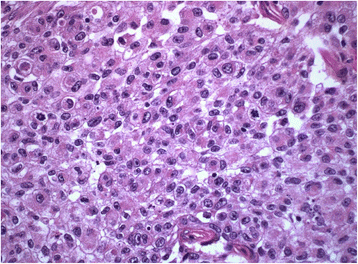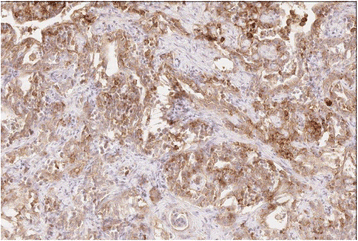Mismatch repair deficiency associated with complete remission to combination programmed cell death ligand immune therapy in a patient with sporadic urothelial carcinoma: immunotheranostic considerations - PubMed (original) (raw)
Mismatch repair deficiency associated with complete remission to combination programmed cell death ligand immune therapy in a patient with sporadic urothelial carcinoma: immunotheranostic considerations
Michael P Castro et al. J Immunother Cancer. 2015.
Abstract
Background: Mismatch repair deficiency (MMRD) is a common pathway of malignant transformation accounting for approximately 15-20 % of human carcinogensis. It has been postulated that MMRD increases tumor antigenicity and highlights a role for immunotherapeutic approach MMR-deficient cancers. This strategy was pursued in a patient with upper tract urothelial carcinoma, and the results are reported here.
Case presentation: Molecular profiling was performed using next generation DNA sequencing and (IHC) testing for MMR and PD-L1. A patient with sporadic, high grade urothelial carcinoma of the renal pelvis was found to have a hypermutator genotype with 73 mutations occurring amidst 62 known drivers of malignancy, and 340 VUS alterations. MMR deficiency phenotype was confirmed by the absence of MSH2 and MSH6 as well as deleterious mutations in these genes. IHC staining for programmed cell death ligand-1 [PD-L1] revealed 2+ staining in 80 % of cells. The patient gained access to combination immunotherapy trial utilizing MEDI4736 and MEDI0680 through a clinical trial. The patient achieved a prolonged, complete remission within two months and had no severe ill effects from the treatment.
Conclusion: Given their ability to generate neo-antigens, MMR-deficient cancers may be uniquely susceptible to immune checkpoint inhibitor strategies, including urothelial tract cancers. Screening for MMR deficient cancers has the potential to become a routine strategy for evaluating the role of PD-L1 inhibitors for patient with advanced disease. (
Trial registration: Clinicaltrials.gov NCT00938834. Registered 13 July 2009).
Keywords: Hypermutator; Immunotheranostic; Immunotherapy; MSH2; MSH6; Microsatellite instability; Mismatch repair deficiency; Mutation load; PD-L1; PD1-L2; Precision immunology; Urothelial cancer.
Figures
Fig. 1
H&E high power showing high-grade urothelial carcinoma
Fig. 2
Strongly positive PD-L1 immunostaining (Clarient GE, Inc.) Sections were cut and dewaxed followed by application of the primary PD-L1 antibody (Cell Signaling Co., clone E1L3N, 1:150) and PD-1 antibody (CellMarque Co., clone MRQ-22, 1:300). After washes, DAB was used as the chromogen and slides were counterstained with hematoxylin
Fig. 3
The baseline film in November reveals a necrotic lymph node in the left para-aortic region adjacent to the ureter. The follow-up study in March 2015 shows a complete disappearance of the lesion
Similar articles
- Patients with Lynch syndrome mismatch repair gene mutations are at higher risk for not only upper tract urothelial cancer but also bladder cancer.
Skeldon SC, Semotiuk K, Aronson M, Holter S, Gallinger S, Pollett A, Kuk C, van Rhijn B, Bostrom P, Cohen Z, Fleshner NE, Jewett MA, Hanna S, Shariat SF, Van Der Kwast TH, Evans A, Catto J, Bapat B, Zlotta AR. Skeldon SC, et al. Eur Urol. 2013 Feb;63(2):379-85. doi: 10.1016/j.eururo.2012.07.047. Epub 2012 Aug 2. Eur Urol. 2013. PMID: 22883484 - Correlating programmed death ligand 1 (PD-L1) expression, mismatch repair deficiency, and outcomes across tumor types: implications for immunotherapy.
Kim ST, Klempner SJ, Park SH, Park JO, Park YS, Lim HY, Kang WK, Kim KM, Lee J. Kim ST, et al. Oncotarget. 2017 Aug 24;8(44):77415-77423. doi: 10.18632/oncotarget.20492. eCollection 2017 Sep 29. Oncotarget. 2017. PMID: 29100397 Free PMC article. - Selection of endometrial carcinomas for DNA mismatch repair protein immunohistochemistry using patient age and tumor morphology enhances detection of mismatch repair abnormalities.
Garg K, Leitao MM Jr, Kauff ND, Hansen J, Kosarin K, Shia J, Soslow RA. Garg K, et al. Am J Surg Pathol. 2009 Jun;33(6):925-33. doi: 10.1097/PAS.0b013e318197a046. Am J Surg Pathol. 2009. PMID: 19238076 - Microsatellite instability and DNA mismatch repair deficiency testing in hereditary and sporadic gastrointestinal cancers.
Gologan A, Sepulveda AR. Gologan A, et al. Clin Lab Med. 2005 Mar;25(1):179-96. doi: 10.1016/j.cll.2004.12.001. Clin Lab Med. 2005. PMID: 15749237 Review. - Hereditary nonpolyposis colorectal cancer: diagnostic strategies and their implications.
Bonis PA, Trikalinos TA, Chung M, Chew P, Ip S, DeVine DA, Lau J. Bonis PA, et al. Evid Rep Technol Assess (Full Rep). 2007 May;(150):1-180. Evid Rep Technol Assess (Full Rep). 2007. PMID: 17764220 Free PMC article. Review.
Cited by
- Mismatch repair deficiency and microsatellite instability in urothelial carcinoma: a systematic review and meta-analysis.
Chandran EBA, Iannantuono GM, Atiq SO, Akbulut D, Sinaii N, Simon NI, Banday AR, Boudjadi S, Gurram S, Nassar AH, Rosenberg JE, Butera G, Teo MY, Sonpavde G, Coleman JA, Apolo AB. Chandran EBA, et al. BMJ Oncol. 2024 Jan;3(1):e000335. doi: 10.1136/bmjonc-2024-000335. Epub 2024 Apr 30. BMJ Oncol. 2024. PMID: 39086924 Free PMC article. - Immune checkpoint blockade therapy for BRAF mutant metastatic colorectal cancer: the efficacy, new strategies, and potential biomarkers.
Zhong J, Sun Z, Li S, Yang L, Cao Y, Bao J. Zhong J, et al. Discov Oncol. 2023 Jun 11;14(1):94. doi: 10.1007/s12672-023-00718-y. Discov Oncol. 2023. PMID: 37302081 Free PMC article. Review. - Case Report: Potential Predictive Value of MMR/MSI Status and PD-1 Expression in Immunotherapy for Urothelial Carcinoma.
Ma YT, Yang HL, Yan L, Hua F, Wang DG, Xu GY, Li Y, Xue YJ, Qin YJ, Sha D, Ning H, Zhao MQ, Yao ZG. Ma YT, et al. Pathol Oncol Res. 2022 Oct 21;28:1610638. doi: 10.3389/pore.2022.1610638. eCollection 2022. Pathol Oncol Res. 2022. PMID: 36338826 Free PMC article. - Intratumor heterogeneity: the hidden barrier to immunotherapy against MSI tumors from the perspective of IFN-γ signaling and tumor-infiltrating lymphocytes.
Wu W, Liu Y, Zeng S, Han Y, Shen H. Wu W, et al. J Hematol Oncol. 2021 Oct 7;14(1):160. doi: 10.1186/s13045-021-01166-3. J Hematol Oncol. 2021. PMID: 34620200 Free PMC article. Review. - Investigation of the relationship between immune checkpoints and mismatch repair deficiency in recurrent and nonrecurrent glioblastoma.
Çakır E, Saygın İ, Ercin ME. Çakır E, et al. Turk J Med Sci. 2021 Aug 30;51(4):1800-1808. doi: 10.3906/sag-2010-166. Turk J Med Sci. 2021. PMID: 33600097 Free PMC article.
References
- Amira N, Rivet J, Soliman C-TG, Le Duc A, Janin A, Cussenot O. Microsatellite instability in urothelial carcinoma of the upper urinary tract. J Urol. 2003;170:1151–4. doi: 10.1097/01.ju.0000086551.22844.cd. - DOI - PubMed
- Rouprêt M, Azzouzi AR, Cussenot O. Microsatellite instability and transitional cell carcinoma of the upper urinary tract. Br J Cancer. 2005;4:489–492. - PubMed
LinkOut - more resources
Full Text Sources
Other Literature Sources
Research Materials
Miscellaneous


